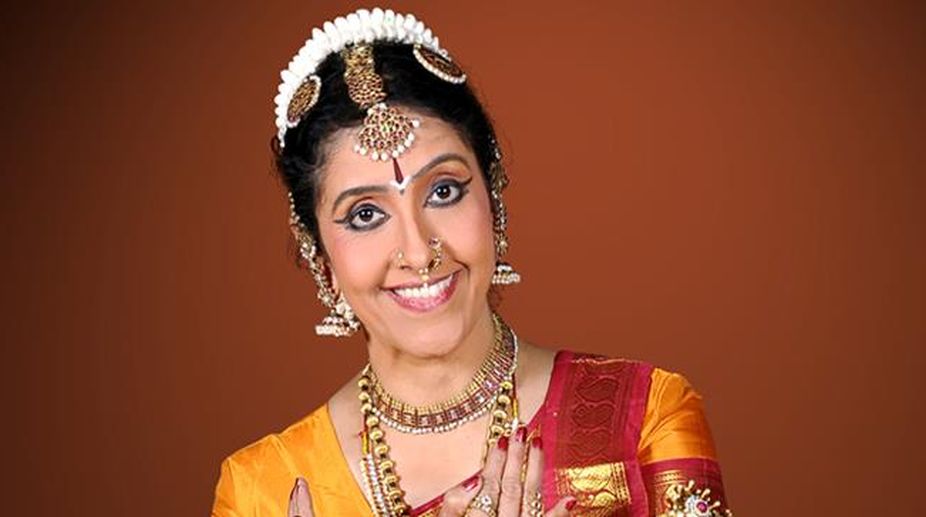Yamini Krishnamurthy, Bharatanatyam icon, passes away at 84
Padma Vibhushan Yamini Krishnamurthy, a celebrated Bharatanatyam and Kuchipudi dancer, has passed away at 84. Tributes pour in from across the cultural world.

Vidushi Bala Devi Chandrashekar (PHOTO: Facebook)
Vidushi Bala Devi Chandrashekar, the US-based Bharatanatyam danseuse, choreographer, scholar and guru, is making waves in India these days, with her latest solo production Karna ~ Destiny's Child, on her annual sojourn to her homeland after successful shows in Prague and Germany. Apart from presenting it in various Sabhas during the famous Winter Sabha Season of Chennai, she was also invited to Varanasi by Kala Prakash. Further scheduled to perform at the National School of Drama (NSD) Delhi, Drishti Festival Bangaluru and at the IIT Chennai, giving a lec-dem for the engineering students, she also performed for dance lovers in the Capital.
Trained under the renowned dancer scholar Padma Subramanyam, Bala Devi has imbibed not only her Guru's technical virtuosity and precision but also the research-oriented scholarly bent of mind towards philosophy. The way she dealt with the well-known story of Karna in Karna ~ Destiny's Child, presented by Art Consultant Suman Doonga at the Stein Auditorium of the India Habitat Centre, underlined the fact that Bala takes her subjects with profundity, philosophical leaning and explores to interpret the spiritual.
Working on the story of Karna for this production, Bala's research work has gone through Mahabharat, Vishnu Puraan, Srimad-Bhagvatam, Venisamharam, Karnabharam to Rashmi Rathi of Ramdhari Singh Dinkar, along with 20 commentaries by different vernacular scholars. Bala's concept and choreography for Karna ~ Destiny's Child, has its Sanskrit script compiled by Umayalpuram Jagadeesan, commentary by Pappu Venugopal and music by Rajkumar Bharathi.
Opening with Mangalam, with an invocation to Lord Ganesh and Saraswathi, the story unfolds in a seamless fashion, enhanced by appropriate Ragas and Talas according to the need of a particular scene and dramatic situation, right from his birth, abandoned floating in the river by his young mother Kunti, received and brought up by charioteer Adhirath, denied training in archery by Dronacharya, trained in warfare by sage Parashuram, his Guru-bhakti, consequently cursed by the Guru for deceiving him, till the battle of Mahabharat and his ultimate death that immortalised him for ever for his virtues of sincere friendship, valore, generosity and integrity.
Bala Devi displayed perfect lines, or Ang-Shuddhi, her virtuosity and impeccable command on rhythm and the emotive skill in her flawless Abhinaya, where not only the facial expression but also the body language changed according to the character role she was playing with specific gait and persona of the particular character. Every move of the entire production was Laya-based, where the war scenes had intricate rhythmic patterns of difficult Jathis. Even the 50 or so Ragas were taken thoughtfully like the Soorya ragam for the Sun God. Bala Devi deserves kudos for her exquisite performance.
* * *
Vrindan was another remarkable evening of classical music and dance presented earlier this week by Impulse at the Stein Auditorium with Arunangshu and friends, featuring Archana Singh in a captivating Kathak recital followed by Sitar by Yoshida Daikiti with Takuya Iida and Arunangshu on Tabla.
The evening opened with a poetry-like performance by Archana Singh, the accomplished Kathak danseuse trained under Gurus Urmila Nagar and Malti Shyam, bestowing her the vigour of the Jaipur Gharana and the sophistication and delicate nuances of the Lucknow Gharana. It was after a long gap that one witnessed an authentic solo (Kathak) performance accompanied by just two instruments ~ Sarangi for the melodic refrain and Tabla.
The melodious Aalap on the sonorous Sarangi by Aamir Khan in the romantic raga Tilak Kamod paved the path for the dance theme "Shringar-Bhakti", portrayed by the danseuse as Radha in search of her beloved Krishna, before the Lehera established the Theka of Teen-Tala for Thaat, Aamad et al.
Archana's recitation of the mnemonics in her poetic offbeat "Padhant" also attracted discerning audiences when she proceeded towards Tode, Tukde, Paran and Chakkardar Tihayee. The Broad Base Tabla of Arunangshu sounded like Pakhawaj and at times Tabla-Tarang. Inspired by the Kathak Bol "Dhi ttam, dhi ttam, dag dag thun tak thun…", he played a composition of his venerated Guru Pt Shankar Ghosh as a Jodidar Tukda.
Archana wove the whole of Kathak repertoire from the traditional Nritta to Abhinay on Thumri Bhairavi on the "Shringar" theme, the love-play of Radha- Krishna, depicting both the Sanyog and Viyog aspects of Sringar Rasa with grace and sensitivity.
Arunangshu was equally brilliant accompanying Yoshida on Tabla. Yoshida has imbibed the melodious feel of her Guru Ustad Shujat Khan. She seems to be a devoted and hardworking disciple. She impressed not only with her right and left hand work on Sitar but also with her ears and the perceptive listening that made her keep the Sitar perfectly in tune all the time adjusting it at the slightest inclination of getting off-tune, which is her greatest asset. Takuya Iida hardly got any opportunity to show his provess on Tabla apart from keeping up the Theka in the Vachaspati compositions Yoshida played.
Advertisement
Advertisement
Advertisement